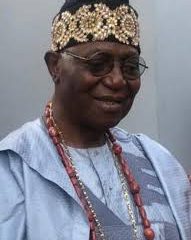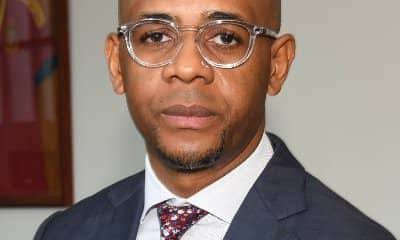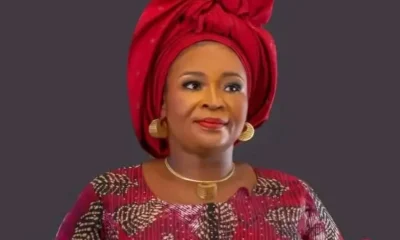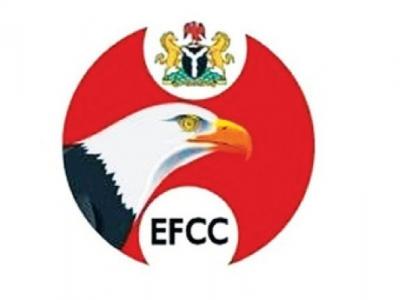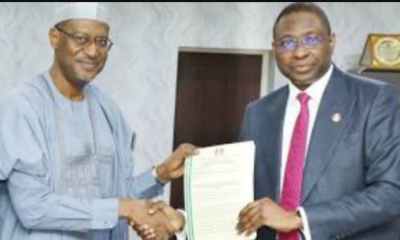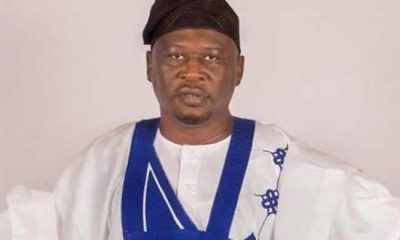News
THE ROLE OF THE MEDIA IN WAR AGAINST CORRUPTION
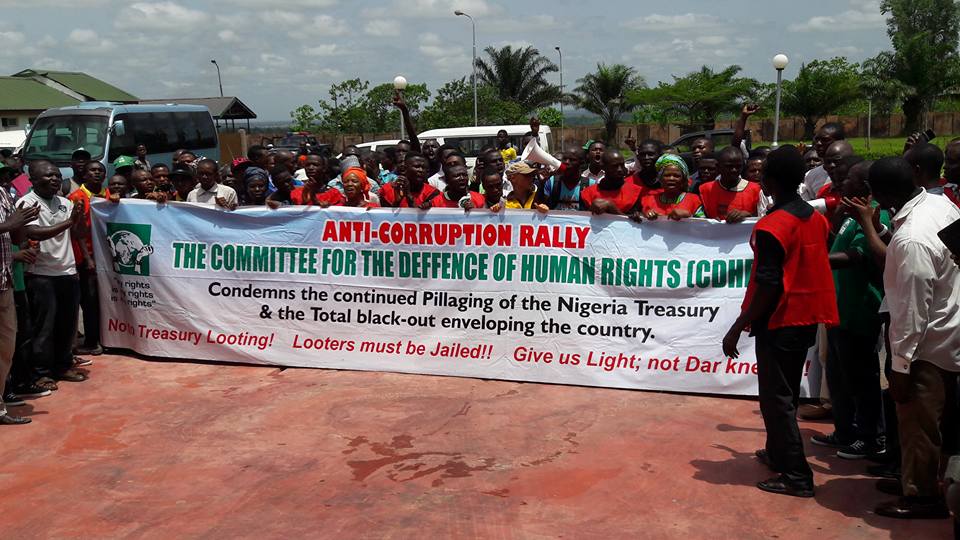
BEING A LECTURE DELIVERED ON ‘THE ROLE OF THE MEDIA IN FIGHTING CORRUPTION’ TO MEMBERS OF THE COMMITTEE FOR THE DEFENCE OF HUMAN RIGHTS (CDHR) VIA A WHATSAPP GROUP (OSUN CDHR) ON SUNDAY, JULY 31, 2016 By ISMAEEL, A. UTHMAN
Protocols,
Fraternal greetings to all comrades – members of the noble Committee for the Defence of Human Rights (CDHR), an organization founded on the ideological principle of social and economic justice and freedom for all citizens of the Federal Republic of Nigeria. I am humbled with the request from the Chairman of CHDR, Osun State Branch, Comrade Akin Asifat, asking me to deliver a lecture on ‘THE ROLE OF THE MEDIA IN ANTI-CORRUPTION WAR’ on this platform. As strenuous as the topic is, the chairman did not inform me of the task until I read his message in the group chat yesterday (not even a direct conversation between the two of us up till now). Nevertheless, CDHR had for long time taught me to be abreast of state, national and international issues for us (CDHR members) to be able to discuss, analyze and have a right-thinking opinion on any of the matters any time we are called upon for conversational discourse. And my profession – journalism taught me to know something about everything and everything about something. The combination of the two ideological organizations makes it a little bit easier for me to put up this presentation. Anything short of this is ignominy to me as a member of CDHR and a journalist.
Before we go into the details of the lecture, we need to explain some keywords in the topic. What are media, corruption and how do the media help in fighting corruption? Analyzing these three fractions of the topic would aid our understanding of the lecture.
MEDIA is a common name or generalization of channels of communication like Television; radio, newspapers, magazine, etc. Media is the plural form of medium (means of expression; channel of communication; middle man, intermediary). Media is just an entity, some people make it works. The functionality of the media depends on the journalists/media practitioners (those who write stories and articles for the media). Media is categorized into two: The print and the electronics. Print media refers to publications that appear in print – generally newspapers and magazines. Print media is the means of making information known by the use of books, catalogues, journals, magazine, newspapers, newsletters and the like WHILES the electronic media is through internet, T.V, radio and the like. Conventionally, the media can be categorised into three: the print, electronics and the (new) social medial. Social media are applications or tools that allow people to create; share, or exchange information, career interests, ideas, and pictures/videos with the aid of computer or rather, Information and Communications Technology (ICT). Professionally, the role of the media is to inform the unprivileged, provide easy access to information to everyone and develop better societies. It is fundamental to state that every journalist is a media practitioner but not all media practitioners are journalist. Another name for media practitioner is PRESS.
CORRUPTION is a global phenomenon. It is, indeed, an ambiguous word which is very difficult to define. The simple definition I can provide for corruption is ‘dishonesty, immorality and decay’, but there are other definitions provided to facilitate our understanding of the concept of corruption. Wikipedia defines corruption as a form of dishonest or unethical conduct by a person entrusted with a position of authority, often to acquire personal benefit. Corruption may include many activities including bribery and embezzlement. Government, or ‘political’, corruption occurs when an office-holder or other governmental employee acts in an official capacity for personal gain. A Professor of Politics, Stephen D. Morris, says that (political) corruption is the illegitimate use of public power to benefit a private interest. An economist, Ian Senior defines corruption as an action to secretly provide a good or a service to a third party so that he or she can influence certain actions which benefit the corrupt, a third party, or both in which the corrupt agent has authority. Daniel Kaufmann, from the World Bank, extends the concept of corruption to include ‘legal corruption’ in which power is abused within the confines of the law — as those with power often have the ability to make laws for their protection(Like the clamour for immunity for Senate President and House of Representatives Speaker in Nigeria). Corruption is a problem of routine deviation from established standards and norms by public officials and parties with whom they interact, Ruzindana (1999).
Political corruption is a persistent phenomenon in Nigeria, and it has overridden other corrupt practices in other sphere of life. The following are other forms of corruption: Parents engage in corrupt practices like getting ‘special centre’ and question paper ahead of exam, particularly UTME, for their children. They connive with UTME officials for their children and wards to cheat during the exam. Lecturers within the university and polytechnic system collect money and sleep with female students to give them undeserved marks. The University and Polytechnic managements also cheat on the government by refusing to remit money and declaring the actual revenue they generate to the government.
The corruption in police is mindboggling. The police extort money from transporters on the road, they ask for money before granting bail and some of them even allegedly rent firearms to armed robbers. Promotion scandal nko? What about the revenue or tax collectors? Some tax officials are alleged to be using two types of receipts to collect revenue. Once receipt is the original; and hence genuine, while the second is usually a false one for the collector’s private use, thus depriving government of its legitimate revenue (Bello Iman 2005).
In journalism, ‘brown envelop’ is a rampant corrupt practice of 80 per cent of Nigerian journalists. In their bids to dignify the collection of the ‘brown envelop, some reporters call it ‘gratification’. Some of them give economic reason (nonpayment of salaries, poor salary, etc) for the collection of the brown envelops, but the fact remains that it is a corrupt practice which must not be encouraged.
Corrupt practices are not limited to the aforementioned.
Corruption in Nigeria is systematic and institutionalized. Every sector of the Nigerian society is corrupt without any exception. The judiciary, which unarguably is the last hope of the masses, is corrupt; thus judgment is given to the highest bidder. This has come to play in many cases!
Nigeria, a country with $193.67 billion GDP (2010) ranks 136 position in the 2015 corruption index by the Transparency International. Institutions perceived as the most corrupt in Nigeria according to 2003 reports are:1- Nigerian Police, 2-Political Parties, 3-National and State Assemblies, 4-Local and Municipal Governments, 5-Federal and State Executive Councils, 6-Traffic police and FRSC, 7-PHCN, 8-NNPC, 9-Nigeria Customs, 10-FIRS
Nigeria and Nigerians (with exception of a few) are wearing the garment of corruption day-by-day. The mindset of an average Nigerian is to amass wealth at a tender age, live large to oppress other people and get rich without stress. This is a thought of a corrupt mind. Corruption in Nigeria is old as the country itself. The roots of corruption are grounded in Nigeria’s social and cultural history, political and economic development, bureaucratic traditions and policies. I would not want to dive into that historical area, to save our precious time.
Corruption is the bane of development in Nigeria because money meant for infrastructural projects and developmental progamme have always been embezzled. Nigerian corruption knows no bound! In June this year, 70 trailers of rice meant for the Internally Displace People were said to be missing. This should tell us how heartless and endemic corruption is to our system. President Muhammadu Buhari defined corruption as the greatest form of human right violation. This is not disputable! Corruption distorts economic and social development, by engendering wrong choices. If we are to continue discussing corruption, we would have to jettison other aspect of this lecture. So, I want to crave your indulgence to leave corruption at this stage and continue with the rest of the lecture.
What are the roles of the media in war against corruption?
The media has the constitutional role of holding the government accountable to the people. Section 22 of the Nigerian Constitution states: “The press, radio, television and other agencies of the mass media shall at all times be free to uphold the fundamental objectives contained in this Chapter and uphold the responsibility and accountability of the Government to the people.” Government in this context is the people running the affairs of the state; the public office holders.
Successful anti-corruption programs and campaigns are dependent on knowledge and information; leadership and collective action. This is where the media comes to play it role. Media are watchdogs, agenda setters, and gatekeepers that monitor the quality of governance, guide the discussion about corruption, mode opinion and lend voice to a wide range of perspectives and arguments. The media play a vital role in unveiling corruption, presenting corruption as public problem, suggesting solutions, and generally empower citizens to fight corruption.
A former President of the World Bank, James D. Wolfensohn, said: “A free Press is not a luxury. A free Press is at the absolute core of equitable development because if you cannot enfranchise poor people, if they do not have a right to expression, if there is no searchlight on corruption and inequitable practices, you cannot build the public consensus needed to bring about change.”
“Civil society and the media are crucial to creating and maintaining an atmosphere in public life that discourages fraud and corruption. Indeed, they are arguably the two most important factors in eliminating systemic corruption in public institutions”—Helping Countries Combat Corruption: The Role of the World Bank” PREM, September 1997
The role of the media in the war against corruption cannot be overemphasized. Fortunately, the roles fall within the constitutional and professional primary functions of the media practitioners which are to inform; educate and enlighten the people. For the purpose of this lecture, let me say that the purpose of the media is not only to raise public awareness about corruption, its causes, consequences and possible remedies but also investigates and reports incidences of corruption.
Ordinarily and traditionally, media is not the tool in the fight against corruption, but they are central in nipping in the bud the corruption trend in Nigeria. This, they (media) could do, by consciously amplifying the effect of anti-corruption legislation, providing accurate and timely information about malfeasance of public office holders, mobilizing the people against corrupt practices (as they did during the military era) motivating political leaders to act morally through their articles and programmes and consistent campaign for attitudinal and cultural change among Nigerians.
There are three mechanisms, according to Anne-katrin Arnold and Sumir Lar (2012), through which the media influence our perceptions and norms: media act as watchdog, agenda setters, and public forum for a diverse set of voices. The watchdog function of the media is perhaps the most obvious with regard to corruption. Media monitor government behavior and guard the public interest by highlighting cases of misadministration, abuse of power and corruption. By covering such cases, they help ensuring accountability and transparency of governments and other powerful factions.
Agenda setting is one of the media’s most crucial democratic functions. As agenda setters, media can put corruption on the public and the political agenda. By discussing issues and putting them on the public agenda, the media draw attention to problems in society. Media attention legitimizes corruption as a problem in the eyes of the audience: if the media think corruption is problematic, the public will pay more critical attention to it. Furthermore, politicians can be compelled by media pressure to reconsider existing legislation and policies. This, we are witnessing since the anti-corruption war of President Muhammadu Buhari.
“Media also provide a public forum for citizens to state their opinions on and experiences with corruption. This mechanism goes back to the idea of the public sphere, which posits that communication flows between state and citizens form a space where accountability and legitimacy are exchanged between both sides. In this ideal democratic public sphere, the media have a responsibility to reflect the plurality of viewpoints and political persuasions in society. This way they maximize the diversity of perspectives and arguments in the public sphere, which can then inform public debate, deliberation, and policy-making. By reflecting a range of perspectives the media can help introduce innovative solutions to the problem of corruption and provide a wide range of suggestions and arguments that citizens can use in their particular circumstances”, Anne-katrin Arnold and Sumir Lar stated.
In line with the three mechanisms, I make bold to say that the Nigeria media have been efficiently supportive to the anti-corruption war of President Muhammadu Buhari since inception. Every media organization (including the pro –government establishment) has taken corruption as cultural and societal vice which must be eliminated to pave way for development. The media have been paying much attention to the anti-corruption war, and in consequence, the Nigeria society is more sensitive to corruption cases. The public office holders are now being watched with keen interest; and before they Jack-Robinson, any act of sleaze on their part would go viral in the media. Example of such is the current case of budget padding in the National Assembly and various corruption cases before the EFCC, ICPC and the courts. Media coverage of corruption has led to considerable political and social change.
However, the government and those who are allergic to corruption need to systematically and practically engage the media in the war against corruption. Fundamentally, they need to guarantee and uphold the freedom of the press and as well protect journalists (make provisions that protect journalists from backlash—or expose them to persecution). The government needs to form coalition with the media, motivate the media practitioners, protect the journalists and ensure press freedom. These steps would assist a lot in enhancing the performance of the media in the war against corruption.
A critical element of Nigeria’s anti- corruption program is an effective media. The effectiveness of the media, in turn, depends on access to information and freedom of expression, as well as a professional and ethical cadre of investigative journalists. The role played by the media in curbing corruption has proved to be extremely valuable. Also, media are an important pillar of culture. Media influence our perceptions of what is right and what is wrong. They inform us about corruption and about solutions to this problem. They make politicians pay attention through wide-spread coverage. They also provide platforms for citizens to voice their opinions and demand accountability from those in power. The ability of the media to change perceptions, norms, and behavior is at the core of their relevance for the fight against corruption.
Dear Comrades, this is how far I could go on the topic. Kindly forgive any error or mistake in the lecture. CDHR!!!
Ismaeel, A. Uthman is the Publicity Secretary, CDHR, Osun State Branch. He is also a media practitioner and a media consultant.
-

 News5 days ago
News5 days agoInsecurity: Kogi Schools Resume On Monday
-

 Opinion4 days ago
Opinion4 days agoDon’t Pull the Plug: Why Nigerians Are Pleading for the U.S. to Extend Its Police Training Program — and Why It Must Synergize With New Military Arrivals
-

 Crime4 days ago
Crime4 days agoVigilante Reportedly Shoots Colleague Dead In Plateau
-
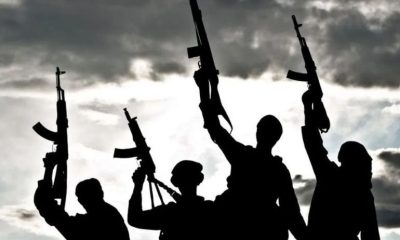
 Crime4 days ago
Crime4 days agoMan Shot Dead In Ambush Along Jol-Sho Road In Plateau



